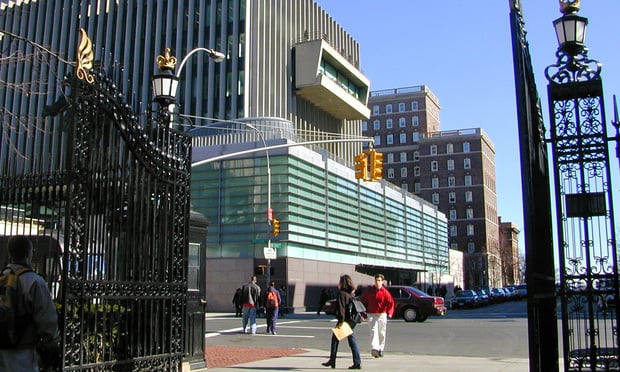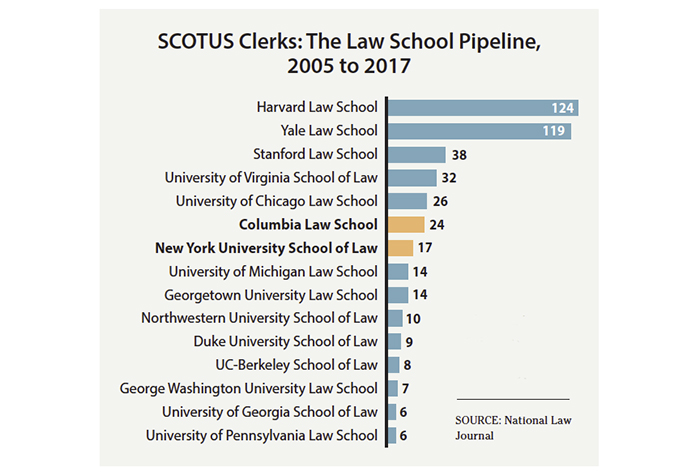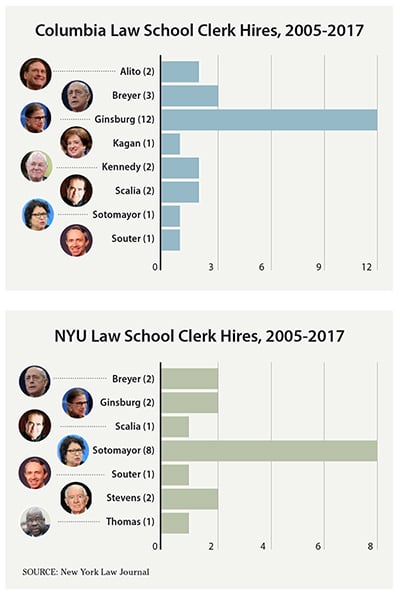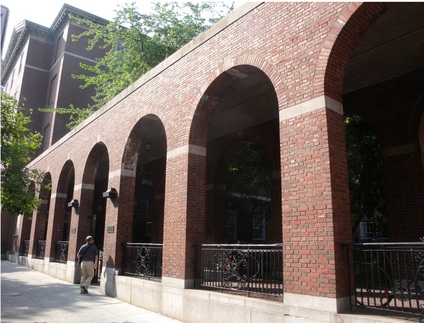 Jerome Greene Hall is the primary home of Columbia Law School.
Jerome Greene Hall is the primary home of Columbia Law School.
Columbia and New York University law school graduates have secured 41 coveted clerkships on the U.S. Supreme Court in the last 13 years while the other 13 New York law schools combined have had only four graduates in those positions.
Despite the two schools’ success, it pales when compared to Harvard and Yale law schools, which produced half of all U.S. Supreme Court clerks between 2005 and 2017, according to an analysis by The National Law Journal.
Still, in the New York market, Columbia and NYU law schools have become a pipeline to the Supreme Court. Often graduates’ success hinges on the efforts of Chief Judge Robert Katzmann and the rest of the Second Circuit where many clerk first. Katzmann, appointed to the circuit court in 1999 by President Bill Clinton, has sent 25 former law clerks up to U.S. Supreme Court since 2005.
➤➤ SCOTUS Clerks: Who Gets the Golden Ticket? Join Supreme Court correspondent Tony Mauro and Hogan Lovells partner Neal Katyal on Thursday, Dec. 14, for a conference call about clerk hiring and diversity. Click here to register.
Columbia Law School alumni have secured 111 Second Circuit clerkships from 2005 to 2017 while NYU graduates have had 92 such clerkships. U.S. Supreme Court clerks almost always have prior clerkships and they are often prestigious ones such as with the Second Circuit.
As a feeder to the U.S. Supreme Court, the Second Circuit is the No. 3 circuit for SCOTUS clerk hires, surpassed by the D.C. Circuit and the Ninth Circuit. Of nearly 500 Supreme Court law clerks from 2005 to 2017, at least 60 had prior clerkships on the Second Circuit.
Priming the Pipeline
Columbia and NYU law schools are ranked fifth and sixth in the country by U.S. News and World Report, which makes graduates extremely attractive to U.S. Supreme Court justices. But the deans of the two schools do not think that rank alone accounts for the schools’ success.

Cornell Law School, after all, is ranked a respectable 13th and still has had only two graduates go on to clerk for the U.S. Supreme Court during the period studied. (Brooklyn Law School and Benjamin Cardozo School of Law have had one each.)
“These are really top jobs to get and I like to think that our students are top students,” said Columbia Law School Dean Gillian Lester. “Part of it is that the judges are looking for really talented people to serve as their apprentices and deputies. There are ways you can use your time at Columbia to make yourself a candidate for these coveted jobs. We start with a really talented group of students and we ask them to work hard so they’ll be an attractive candidate to the judges.”
The school has 47 faculty members who have had clerkships including 24 former Supreme Court clerks, providing students and graduates with experience to draw on. It also looks to invite Supreme Court justices to campus anytime they’re in New York City. But one of the most valuable ways to get a Columbia Law School graduate hired to clerk on the U.S. Supreme Court is for a Columbia graduate who already is doing the job to excel, she said.
“We want the courts to look to Columbia and say, ‘I know when I hire a clerk from Columbia, I’m going to get someone who is well prepared before arriving in my chambers,’” she said.
 The data seems to suggest that this is true; hiring one Columbia clerk makes it more likely to hire another Columbia clerk. Supreme Court Justice Ruth Bader Ginsburg—who graduated first in her class from Columbia Law School in 1959, after first attending Harvard—has hired 12 Columbia clerks in 13 years, accounting for half of all the Columbia clerks in that time period.
The data seems to suggest that this is true; hiring one Columbia clerk makes it more likely to hire another Columbia clerk. Supreme Court Justice Ruth Bader Ginsburg—who graduated first in her class from Columbia Law School in 1959, after first attending Harvard—has hired 12 Columbia clerks in 13 years, accounting for half of all the Columbia clerks in that time period.
“I think it would be misleading to assume that it’s all about networks but nevertheless it’s important to have students see judges and know what judges do,” Lester said.
And when it comes to Ginsburg, Columbia students overwhelmingly want to clerk for her.
“It’s well known to anybody who goes to Columbia that she’s one of ours. She’s been a large figure in their lives from the day they walked through the door,” Lester said.
Credibility Counts
NYU School of Law Dean Trevor Morrison clerked for Ginsburg, which gives him some insight into what justices want, but he’s also careful to say that all justices don’t think alike.
“My own experience has underscored the importance of meaningful recommendations from faculty, and from law firms, that can speak in a detailed way to the real strengths of the applicants, from people who know the court and the judge and therefore have credibility,” Morrison said.
 New York University School of Law.
New York University School of Law.
Often, when that recommendation comes from Katzmann, Morrison believes that Supreme Court justices take it very seriously.
“Chief Judge Katzmann is an extremely good judge and rightly admired very broadly in academia, at the Supreme Court and by members of the practicing bar as well,” he said.
Eight of NYU’s 17 Supreme Court clerkships have been with Justice Sonia Sotomayor but Morrison said he isn’t sure why. He does say that once an NYU graduate gets such a position that makes it easier for other NYU graduates to follow.
Both schools cite full-time clerkship offices that guide students and alumni through the entire process. Lester said the Columbia clerkship director meets with 500 students and graduates a year.
St. John’s University Law School Dean Michael Simons believes the students who get the clerkships are very deserving. Still, he sees value in widening the pool of applicants. St. John’s, too, regularly brings judges to campus and has a variety of programs to mentor students for clerkships. But the school has not had a Supreme Court clerk.
“My message to the Supreme Court is the same to the law firm partners,” he said. “There is tremendous talent outside of five law schools in the country and they may be surprised what they get by broadening their search horizons.”
The National Law Journal survey shows that it’s still the way it’s always been: Harvard, Yale and then everyone else.
Harvard law professor Richard Lazarus insists there’s a reason for Harvard’s dominance: ”The students who get into this place are extraordinarily gifted. They are gifted academically. They are gifted in life experiences. That doesn’t mean that there aren’t students at other schools who are as good as the Harvard and Yale students. There are. But the concentration we have here is, I think, unparalleled.”
But Micah Schwartzman, who heads the clerkship committee for University of Virginia School of Law, thinks students from other law schools are at a serious disadvantage.
“Some of the justices don’t interview or even consider students from other schools, or don’t take those students seriously even when they come from the same feeder judges, and have perfect credentials,” he said.
Tony Mauro and Karen Sloan contributed to this story.


